University Review
Pioneering innovative research
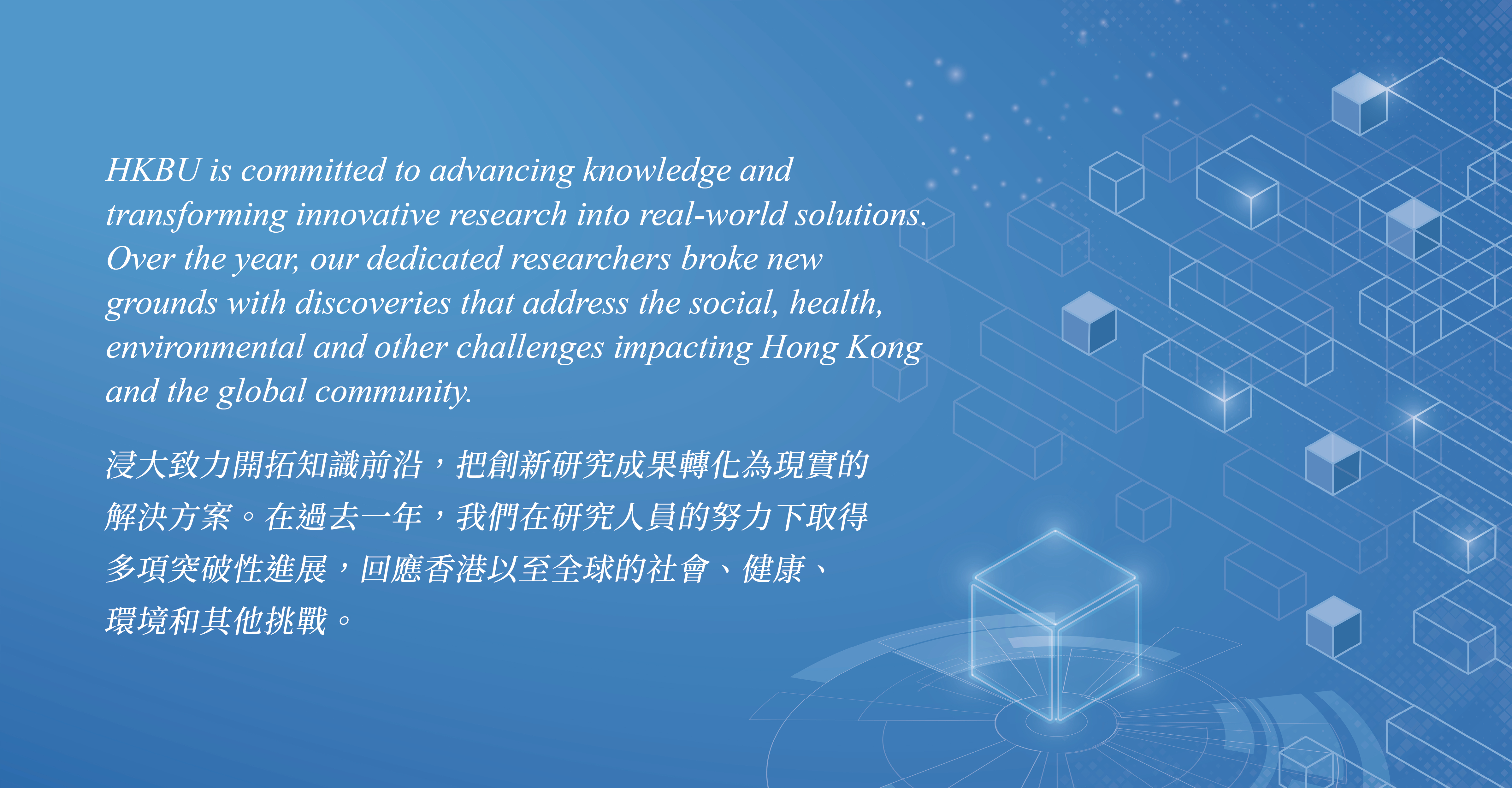

.
Achieving research excellence
RAISe+ supports disease diagnosis and Chinese herbal medicine projects
Two HKBU translational research projects were awarded funding from the Research, Academic and Industry Sectors One-plus (RAISe+) Scheme under the Innovation and Technology Commission of the HKSAR Government. Led by Professor Terence Lau, Interim Chief Innovation Officer of HKBU, and Professor Bian Zhaoxiang, Associate Vice-President (Clinical Chinese Medicine) and Director of the Centre for Chinese Herbal Medicine Drug Development respectively, the two projects focused on a fully automated multiplexing molecular detection platform for disease diagnosis and a new Chinese herbal medicine for treating functional constipation in the elderly.




New Chinese medicine drug receives U.S. FDA orphan drug designation
A new drug developed by HKBU’s Centre for Chinese Herbal Medicine Drug Development (CDD) became the first botanical drug in Hong Kong to have obtained the orphan drug designation from the U.S. Food and Drug Administration (FDA). Using effective components of a Chinese herbal medicine, Chaenomelis Fructus, the drug is used in the treatment of the rare disease, myofibrillar myopathy. Success in obtaining orphan drug (a drug used for treating rare disease) designation will accelerate the approval process of the new drug, including speeding up of the review process, waiver of the marketing authorisation fee, and seven years of market exclusivity for the approved product.


Novel Chinese medicine authorised by U.S. FDA for clinical trial
CDD made significant progress in developing novel Chinese medicine for treating chronic constipation. With its success in the Investigational New Drug Application to the U.S. Food and Drug Administration, CDD was authorised to conduct a phase I clinical trial of the new drug. This is the first time that a new botanical drug developed in Hong Kong was authorised to conduct a clinical trial in the US. The clinical trial will evaluate the safety, tolerability, and pharmacokinetics profile of the new drug on healthy individuals.


Launch of Life Science Imaging Centre to promote transdisciplinary research
HKBU’s Life Science Imaging Centre came into operation in January 2024. The Centre is a central research facility to support the University’s transdisciplinary research and knowledge creation endeavours, in line with its Institutional Strategic Plan. Equipped with advanced brain imaging facilities, the Centre supports academics across different disciplines in translating these cutting-edge facilities into impactful research projects that can address various emerging global issues.




Making breakthroughs in medical and health discoveries
Potential of herbal extract to treat pancreatic cancer
A research led by Dr Joshua Ko Ka-shun (School of Chinese Medicine) found that isoliquiritigenin (ISL), a flavonoid isolated from the Chinese herbal medicine licorice, can inhibit pancreatic cancer progression. It may also enhance the efficacy of conventional chemotherapeutic drugs in treating pancreatic cancer. It is the first time that a research group reported the anticancer potential of ISL in treating pancreatic cancer.


Novel drug delivery system for Alzheimer’s disease treatment
A research team comprising Professor Li Min and Dr Ashok Iyaswamy (School of Chinese Medicine), along with other local, Mainland and overseas scientists, developed a novel drug delivery system for Alzheimer’s disease (AD). The researchers engineered exosomes, extracellular vesicles released by cells, to effectively carry the bioactive compound Corynoxine-B extracted from the Chinese herbal medicine Gouteng to the brain of mice with AD. As Corynoxine-B can induce autophagy, a process that maintains the health of cells, this new drug delivery system using exosomes can improve cognitive function and movement while reducing the symptoms of AD.


Potential of artemisinin derivative in treating human obesity
A research team led by scholars at School of Chinese Medicine including Dr Xavier Wong Hoi-leong, Professor Bian Zhaoxiang and Dr Pallavi Asthana, using computer simulated-drug screening methods, discovered that artesunate, a derivative from Qinghaosu (artemisinin) which is a natural product from the Chinese herb Artemisia annua, is a powerful anti-obesity agent. They also examined the effects of artesunate treatment in animal models with obesity and investigated its impact on a hormone that regulates bodyweight and appetite.


Study on the use of ruthenium compound as an effective anticancer agent
The current treatment for cancer is largely based on the use of Cisplatin, an FDA-approved platinum-based chemotherapeutic agent. Considering the significant side effects it may cause, Dr Man Wai-lun (Department of Chemistry), in collaboration with Dr Ni Wenxiu at the Medical College of Shantou University, led a research team to investigate the potential of other metal complexes, specifically ruthenium, as a potentially more effective anticancer agent with fewer side effects. With this promising premise, the study has already secured funding from an HKBU start-up grant.


Advancing the development of sustainability
Enhancing the production and quality of humic acid for agriculture
Dr Zhao Jun (Department of Biology) led a team of researchers to develop new ways to produce humic acid (HA), a soil conditioner in organic farming, by using agricultural waste, contributing to sustainable agriculture and waste management. Dr Zhao collaborated with researchers from Tsinghua University, Beijing Institute of Technology and Zhejiang Gongshang University to improve hydrothermal humification technology and the process of HA formation. Research in the fields of biomass conversion and biowaste utilisation can contribute to achieving long-term environmental resilience while stimulating economic growth.


Predicting heat stress trends in Mainland China
A study led by Professor Gao Meng (Department of Geography) discovered that there is a trend of increasing humidity in the northern part of China which is not observed in the south. This phenomenon will ultimately become a prominent factor in determining the occurrence of extreme hot and humid weather, and lead to widespread heat stress across the entire eastern part of China, the most populous region of the country, by the end of this century.


Study on ozone-climate control strategy
Dr Lyu Xiaopu (Department of Geography), one of the research leads of an international study “A synergistic ozone-climate control to address emerging ozone pollution challenges”, shed light on why a synergistic ozone-climate control strategy is critical. Dr Lyu and his team are working with the Environmental Protection Department of the HKSAR Government on an ozone project and are in a position to share their expert advice and policy briefs, in hopes that their ideas on ozone-climate control can be applied in future projects.


Making blockchain technology more efficient
To address the pressing issues associated with the cost of blockchain data maintenance and the security of off-chain data, Professor Xu Jianliang (Department of Computer Science) led a research team to develop an innovative solution that can improve “gas” (a unit of computation that measures the work required for actions within blockchains) efficiency and ensure the integrity of queries within a blockchain network. In the solution developed by the HKBU research team, the gas expenses can be reduced by up to 78%. The project was awarded a Silver Medal at the 49th Geneva International Exhibition of Inventions.


Identifying Arctic amplification as cause for dust reduction
A research team led by Professor Gao Meng (Department of Geography) discovered that intensified Arctic amplification associated with global warming, which led to changes in atmospheric circulation, is the underlying cause of the decline in dust levels across West and South Asia over the past two decades. The findings highlighted the need to mitigate dust emission in the formulation of long-term, sustainable plans to counter natural and urban-level desertification in West and South Asia.


Extending the frontiers of knowledge
Study on post COVID-19 syndrome
HKBU established the “HKBU Chinese Medicine Telemedicine Centre Against COVID-19” during the COVID-19 outbreak to provide free treatments for COVID-19 patients. The research team led by Professor Bian Zhaoxiang (School of Chinese Medicine) found that 55% of the patients who sought medical treatment from the Centre continued to experience at least one long COVID symptom for six months to a year after diagnosed with an infection. The data collected deepened the medical community’s understanding of the symptoms during the early and middle stages of COVID-19 infection as well as the post-COVID syndrome. It enabled the public to understand the effectiveness of Chinese medicine in treating COVID-19 and also showed that the tele-services of Chinese medicine can be an important component of Hong Kong’s healthcare and disease prevention system.


Monitoring public opinion on social inclusion policies
A research team led by Dr Lee Siu-yau (Department of Government and International Studies) developed the Support for Social Inclusion Score (SFSIS), a survey tool to gauge public opinions on social inclusion policies for marginalised groups. It allows policymakers to track public support for relevant policies and evaluate their effectiveness. The first survey conducted using SFSIS revealed that policies targeting the elderly enjoy the strongest support by Hong Kong citizens, while policies concerning sexual minorities receive the weakest support.


Showcasing ancient artefacts through 3D modelling
A transdisciplinary team led by Dr Sammy Li (Department of History) developed an online collection of 20 ancient Chinese artefacts using 3D scanning, enabling the general public to view these objects spanning from the Neolithic period to the Qing dynasty. The three-year project focuses on examining the differences and interactions between Chinese and Western conceptions of space in art. The team will develop rotatable 3D models, create a 3D database for five selected early Chinese paintings, and build an offline learning platform and an augmented reality application to facilitate mixed-mode teaching. Through these platforms, users can experience the paintings as three-dimensional recreations, navigate the virtual space, and explore the shifting vantage points of the artists.


Reducing psychological distress through online counselling
A 10-week internet-based cognitive behavioural therapy (iCBT) programme “REST Online” developed by a research team led by Dr Pan Jiayan (Department of Social Work) was found effective in reducing university students’ psychological distress, symptoms of depression and anxiety, and negative thoughts and emotions, while notably increasing their positive thoughts and emotions. A study conducted by the research team suggested that the programme can serve as an alternative service model to meet the increasing mental health needs of university students.


Easing parental stress through Cognitive-Behavioural Intervention
To alleviate the stress of parental caregivers, Professor Daniel Wong Fu-keung (Department of Social Work) collaborated with Heep Hong Society in a joint study – “Project P.S.I. (Parental Stress Intervention): Intervention Strategies for Parental Stress in Preschool Units” – to identify those at risk and invite them to a Cognitive-Behavioural Therapy (CBT) intervention to improve their social functioning and emotional resilience. Both the parents and the children who received the CBT intervention showed a healthy level of negative emotions and a high level of resilience, supporting the fact that CBT is a promising intervention approach for minimising parental stress and mental health symptoms of their children.


Fostering research collaboration and exchange
Fostering research and industry collaborations with Greater Bay Area
An HKBU delegation visited Shenzhen and Guangzhou in August 2023 to strengthen the collaboration with the Greater Bay Area (GBA) in different aspects including technological innovation, technology transfer and Chinese medicine. The delegation met with representatives of various government authorities, research institutions and enterprises to explore collaboration opportunities on the joint application for research projects to promote the development of Chinese medicine in the GBA, and to conclude related agreements that will facilitate research on quality standards of the classic Chinese medicine formulas.


Establishing seed fund with Guangdong Department of Science and Technology
The Department of Science and Technology of Guangdong Province, HKBU, and Beijing Normal University – Hong Kong Baptist University United International College (BNU-HKBU UIC) signed a collaboration agreement in May 2024 to provide joint support to in-depth scientific and technological cooperation. The three parties will establish a seed fund pool amounting to HK$90 million to conduct in-depth science and technology research projects and strengthen cooperation in areas of research infrastructure and talent training. The fund will support up to 10 joint research teams and projects each year, particularly in strategic areas of data science, artificial intelligence, and interdisciplinary applications.
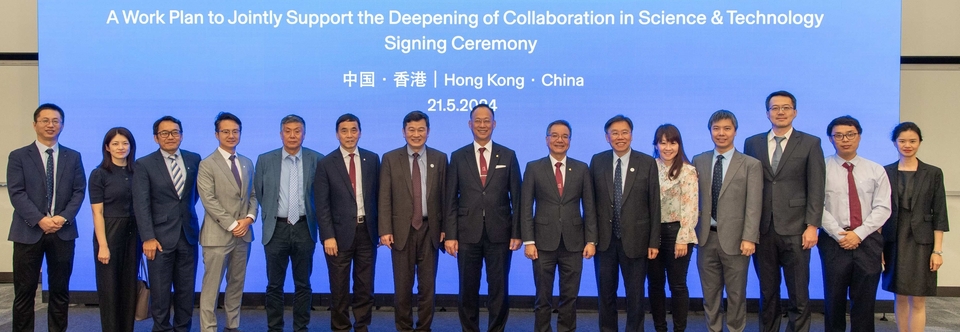

Joint laboratory promotes environmental new pollutants and toxicology research
The State Key Laboratory of Environmental and Biological Analysis (SKLEBA) (Hong Kong Baptist University) and Agilent Technologies Co. Ltd (China) jointly established the “SKLEBA (HKBU) – Agilent Joint Laboratory”, with the research focus on environmental new pollutants analysis and toxicology. The Joint Laboratory provides scientific support to authorities in formulating public health policies, making contributions to Hong Kong, the GBA, and the nation.


Fostering knowledge transfer between Hong Kong and Guangdong
Ms Wang Yueqin, the Director-General of the Department of Science and Technology of Guangdong Province (GDSTC), led a delegation to visit HKBU in January 2024 to exchange ideas on innovation promotion, technology development and knowledge transfer between Hong Kong and Guangdong. To foster research collaboration, GDSTC, HKBU, and BNU-HKBU UIC jointly committed to investing resources in establishing collaborative research projects, pooling strengths from both the government and academia to create a greater impact for society.
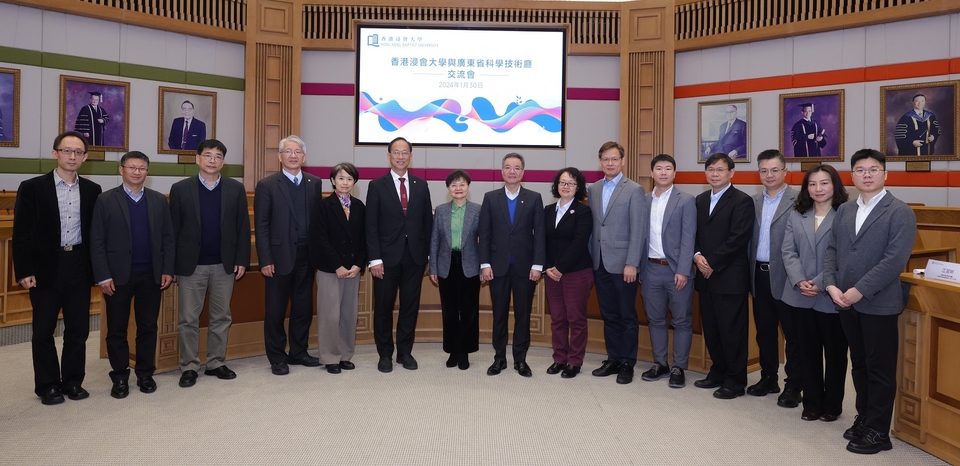

Analysing social problems from global perspectives
The “International Doctoral Symposium on Global Perspectives on Social Problems, Policy, and Practice” held in January 2024 hosted by the Faculty of Social Sciences attracted over 150 participants. The symposium brought together outstanding young scholars from around the world to explore the impact of globalisation on social issues and policies.
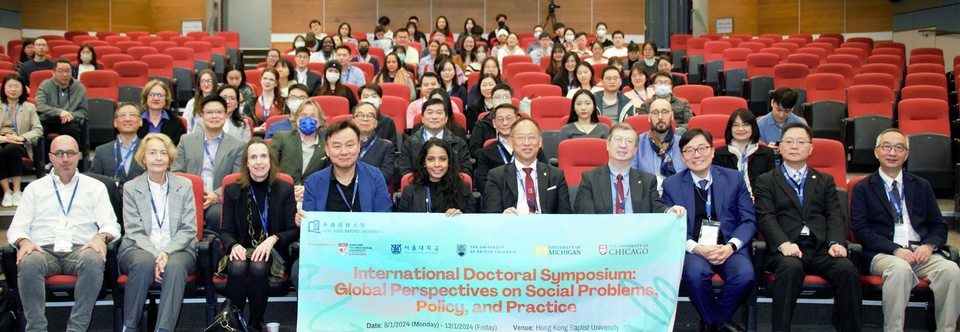

Benefitting society through knowledge transfer
Collaborating with UMP on Chinese-Western medicine research
HKBU and UMP Healthcare Group (UMP) signed a Memorandum of Understanding (MOU), marking the beginning of their strategic partnership in exploring potential models of integrative Chinese-Western medicine by research collaboration. By providing scientific data support and developing innovative technologies for integrative Chinese-Western medicine, it offers the prospect of achieving the best clinical diagnosis and treatment effects for the benefit of patients.


Promoting innovation and technology development with CMA
HKBU and the Chinese Manufacturers’ Association of Hong Kong (CMA) formed a partnership and signed a MOU to promote the innovation and technology development in Hong Kong, with specific focuses on fostering collaborative research on green and life science technologies, as well as facilitating knowledge transfer. Under this university-industry partnership, the collaboration will drive innovation and progress in the areas of green finance, carbon neutrality, biotechnology, property technology and sustainability.


Joint centre with China Resources on Smart Chinese Medicine
HKBU and China Resources Research Institute of Science and Technology Co. Limited, a subsidiary of China Resources Enterprise Limited, signed a research and development collaboration agreement to establish the CR-BU Joint Innovation Centre on Smart Chinese Medicine. The Centre aims to drive advancements in Chinese medicine and the development of an innovative Chronic Disease Management System. The system enables the comprehensive tracking of a patient’s medical journey, from diagnosis to treatment, and also provides extended functions for follow-up medical care and long-term health management, which are vital for monitoring chronic disease.


Cultivating entrepreneurship
Clinching awards at innovation and entrepreneurship competition
HKBU students joined a university student team and clinched the silver award in the Start-up Division at the 2023 Qianhai-Guangdong-Hong Kong-Macau-Taiwan Youth Innovation and Entrepreneurship Competition organised by the Qianhai Authority. Their winning project is about producing a microbial preparation called “Zhangyun Microbial Fertiliser” which aims to address the environmental pollution and health issues caused by chemical fertilisers and pesticides.


Shining in Techathon+ 2024
HKBU students and alumni formed into different teams and won six awards in Hong Kong Techathon+ 2024, jointly organised by Hong Kong Science and Technology Parks Corporation, and 10 co-organising universities, including HKBU. Participants collaborated in teams and designed their own innovation proposals with a balance of innovation, creativity, social impacts and feasibility, based on one of the four major technology themes, namely “Trusted AI & Data Science”, “Sustainability & ESG”, “Digital Economy” and “Smart Cities”.


HKBU start-ups excel at social enterprise challenge
Three start-up companies established by HKBU student and alumni achieved remarkable results at the Hong Kong Social Enterprise Challenge 2024, clinching awards that highlight their innovations to address societal needs through sustainable business models.


Start-ups showcase at Asia Summit on Global Health
Ten HKBU start-ups participated in the “InnoHealth Showcase” exhibition of the Asia Summit on Global Health 2024, exploring the prospects and business opportunities in the Asian healthcare industry. Representatives from three of these start-ups also engaged in the project promotion sessions, introducing affordable and convenient medical and diagnostic tools during the thematic sessions of “AI & Digital Health” and “Medical Devices & Diagnostics”.
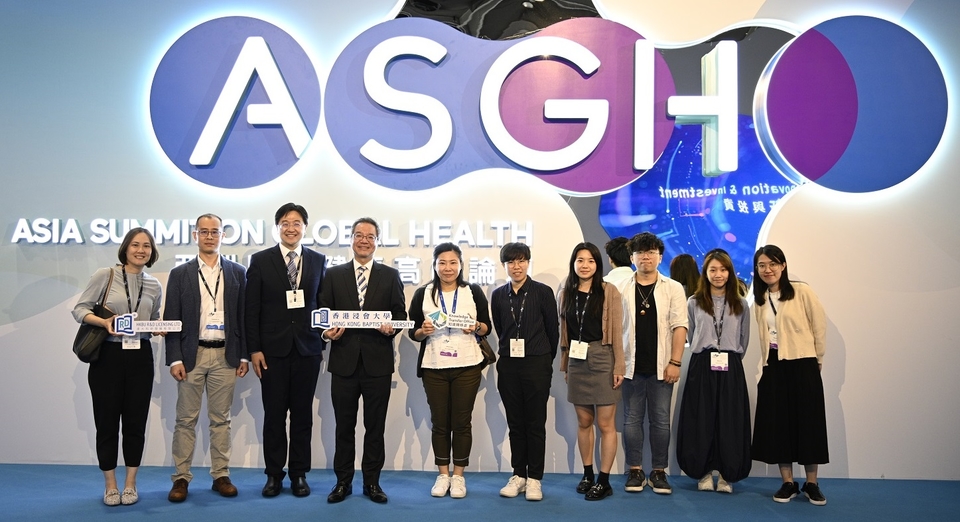

Green entrepreneurs participate in Future Ecopreneur Programme
HKBU students who have co-founded two green social enterprises participated in the Future Ecopreneur Programme jointly launched by Hang Seng Bank, Wofoo Social Enterprises, and Hong Kong Science and Technology Parks Corporation (HKSTP). They will receive training for two-and-a-half years and develop solutions for climate issues. Their social enterprises will also join the Ideation Programme under HKSTP, further realising their entrepreneurial plans.

